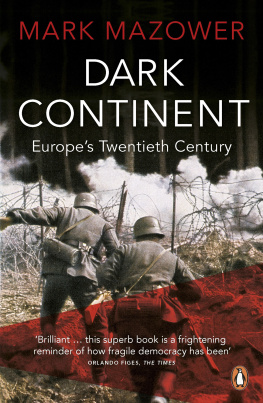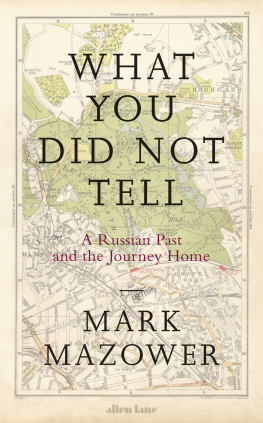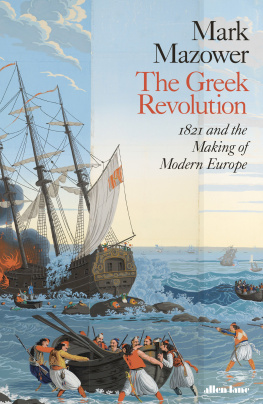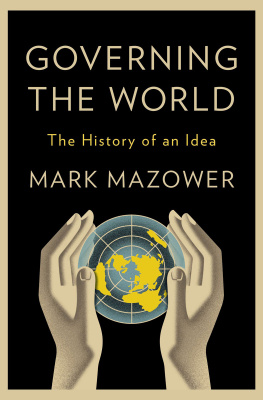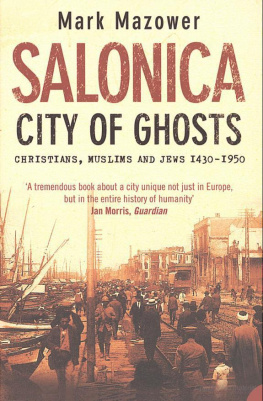

Contents
Mark Mazower
DARK CONTINENT
Europes Twentieth Century

PENGUIN BOOKS
UK | USA | Canada | Ireland | Australia
India | New Zealand | South Africa
Penguin Books is part of the Penguin Random House group of companies whose addresses can be found at global.penguinrandomhouse.com.
First published by Allen Lane 1998
Published in Penguin Books 1999
Copyright Mark Mazower, 1998
All rights reserved
The author and publishers gratefully acknowledge Harcourt Brace & Company for permission to reprint the map The Expulsion of Germans from Central Europe, 19457
The moral right of the author has been asserted
Cover credit: German raiding party by Krnke, 1940 (arg-images)
ISBN: 978-0-141-98998-3

THE BEGINNING
Let the conversation begin
Follow the Penguin Twitter.com@penguinUKbooks
Keep up-to-date with all our stories YouTube.com/penguinbooks
Pin Penguin Books to your Pinterest
Like Penguin Books on Facebook.com/penguinbooks
Listen to Penguin at SoundCloud.com/penguin-books
Find out more about the author and
discover more stories like this at Penguin.co.uk
PENGUIN BOOKS
DARK CONTINENT
Magnificent Mazower traces the rise of some of the most dangerous ideas in history which spread in the wake of the First World War, from virulent nationalism to the increasing importance of race Alexandra Richie, Observer
Mark Mazower, reconstructing a more honest European history from the skeletons in the 20th-century cupboard is anxious to clear away the liberal myth-making and the false history that have served to cloak what actually happened Dark Continent is an exemplary anti-revisionist tract, written with verve and splendidly argued Richard Gott, New Statesman
A model of synthesis, sharp, anything but bland, courageous and original Michael Ignatieff, Guardian Books of the Year
Division and hatred and the reinvention of Europe in this, its most ruinous century are the themes of Mark Mazowers book, the finest essay on Europe of our time Robert Fox, European
Mark Mazower, one of our brightest young historians, has managed to write about this subject in such a way that you want to turn the pages valuable and well written Norman Stone, Guardian
I was impressed by Mark Mazowers Dark Continent. Anyone who still thinks of the history of Europe as the triumph of liberalism and democracy should read this sombre survey of 20th-century Europe as the cradle of barbarity Eric Hobsbawm, New Statesman, Books of the Year
Mark Mazower has provided a rich mixture in his highly individual and intelligent interpretation of Europes twentieth-century history Richard Crampton, The Times Literary Supplement
The central thrust of his argument, expressed with verve and perception, is that the century has seen a fundamental struggle between liberalism, fascism and communism Mazower presents a challenging and disturbing thesis Richard Overy, Sunday Telegraph
ABOUT THE AUTHOR
Mark Mazower is the author of Salonica: City of Ghosts, which won both the Duff Cooper Prize and the Runciman Award, The Balkans: A Short History, which won the Wolfson Prize for History, and Inside Hitlers Greece: The Experience of Occupation, 194144, which was the Longman/History Today Book of the Year, and Hitlers Empire: Nazi Rule in Occupied Europe. He is Professor of History at Columbia University and has taught at Birkbeck College, London, Sussex and Princeton. He lives in New York.
for Ruthie
and in memory of
Frouma Mazower
Max Mazower
Reg Shaffer
Preface
Why then do the European states claim for themselves the right to spread civilization and manners to different continents? Why not to Europe itself?
Europe may seem to be a continent of old states and peoples, yet it is in many respects very new, inventing and reinventing itself over this century through often convulsive political transformation. Some nations such as Prussia have been wiped off the map in living memory; others like Austria or Macedonia are less than three generations old. When my grandmother was born in Warsaw, it was part of the Tsarist empire, Trieste belonged to the Habsburgs and Salonika to the Ottomans. The Germans ruled Poles, the English Ireland, France Algeria. The closest much of Europe came to the democratic nation-state which has become the norm today were the monarchies of the Balkans. Nowhere did adults of both sexes have the vote, and there were few countries where parliaments prevailed over kings. In short, modern democracy, like the nation-state it is so closely associated with, is basically the product of the protracted domestic and international experimentation which followed the collapse of the old European order in 1914.
The First World War mobilized sixty-five million men, killed over eight million and left another twenty-one million wounded; it swept
In the short run, both Wilson and Lenin failed to build the better world they dreamed of. The communist revolution across Europe did not materialize, and the building of socialism was confined to the Soviet Union; the crisis of liberal democracy followed soon after as one country after another embraced authoritarianism. By the late 1930s the League of Nations had collapsed, the Right was ascendant, and Hitlers New Order looked like Europes future. Against the liberal defence of individual liberties the Nazis counterposed the racial welfare of the collectivity; against liberalisms doctrine of the formal equality of states it offered Darwinian struggle and rule by racial superiors; against free trade it proposed the coordination of Europes economies as a single unit under German leadership. Yet how bewilderingly fast fortunes changed in the struggle of ideologies. In the 1940s the centurys watershed the Nazi utopia reached its zenith, and then as swiftly collapsed. Fascism became the first major ideology to suffer conclusive defeat at the hands of the history it claimed to have mastered.
In the long run, the 1940s were important for another reason too. The exhausting, murderous experience of total war the culmination of nearly a century of imperial and national struggles inside and outside the continent led to a growing weariness with ideological politics across the continent. The great tide of mass mobilization began to ebb, and with it the militarism and collectivism of the inter-war years. Believers became cynics at worst, at best apathetic, resigned and domesticated. People rediscovered democracys quiet virtues the space it left for privacy, the individual and the family. Thus after 1945, democracy re-emerged in the West, revitalized by the challenge of war against Hitler, newly conscious of its social responsibilities. Only now it faced competition from the Left not the Right, as the Red Army, having crushed Nazi Germanys imperial dreams, brought communism to the new Soviet empire in eastern Europe.
Next page
